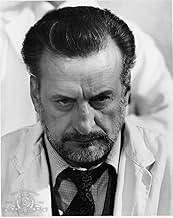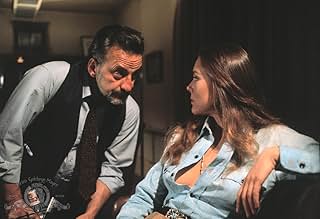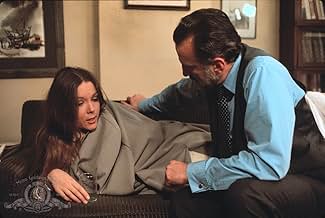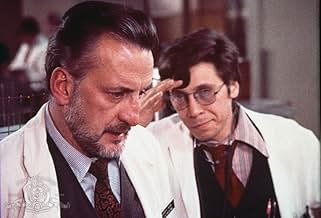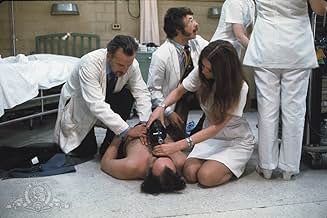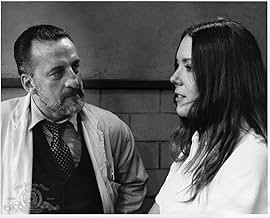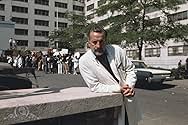AVALIAÇÃO DA IMDb
7,1/10
7,9 mil
SUA AVALIAÇÃO
Um chefe de pessoal do hospital luta para encontrar um sentido em sua vida durante uma série de mortes de pessoal.Um chefe de pessoal do hospital luta para encontrar um sentido em sua vida durante uma série de mortes de pessoal.Um chefe de pessoal do hospital luta para encontrar um sentido em sua vida durante uma série de mortes de pessoal.
- Ganhou 1 Oscar
- 7 vitórias e 5 indicações no total
Richard Dysart
- Dr. Welbeck
- (as Richard A. Dysart)
Avaliações em destaque
It's hard to tell in this scenario. We've all heard about (or maybe even experienced) some quirky stuff in hospitals, but this one (fashioned by Paddy Chayefsky) really takes the cake.
Seldom has there been such an odd assortment of patients, staff and docs under one roof. Agreed some reforms are needed in the medical profession which warrant exposing.
But Chayefsky creates a circus, replete with sexually maladjusted interns, an Indian medicine man performing out-patient rites, and a mad killer stalking the corridors for victims and bopping them over the head. That George C. Scott keeps a straight face must be one of the great acting feats of '71.
The script goes so over-the-top that it gives that term a new meaning. Enough to make one want to cancel their Medicare and go alternative all the way.
Where's that grape seed extract and Noni juice?
Seldom has there been such an odd assortment of patients, staff and docs under one roof. Agreed some reforms are needed in the medical profession which warrant exposing.
But Chayefsky creates a circus, replete with sexually maladjusted interns, an Indian medicine man performing out-patient rites, and a mad killer stalking the corridors for victims and bopping them over the head. That George C. Scott keeps a straight face must be one of the great acting feats of '71.
The script goes so over-the-top that it gives that term a new meaning. Enough to make one want to cancel their Medicare and go alternative all the way.
Where's that grape seed extract and Noni juice?
10cer1
Certainly the highlight of this film is it's cast.
Diana Rigg, George C. Scott, Bernard Hughes to mention a few.
I have accumulated more time in hospitals and with doctors over the years than I care to think about.
This comedy attacks the pomp and pretension in all aspects of our society, through the setting of one of it's "Most Haughty" institutions... the Medical profession.
The idea that such goings on could be possible, might be a shock to some, but is a delight to anyone with the perspective of experience.
Dr Brock (Scott) undergoes a mid-life crisis of monumental proportions before our eyes as we, and he, become enamored with the prospect of his involvement with Miss Drummond (Rigg).
The thread of the absurd is woven into this wonderful mix in the form of the irony that the Hospital appears to be killing it's own workers as they mismanage their affairs in it.
The climax is unpredictable (unless you've seen it) and made even more hilarious if you happen to guess.
It's not everyone's brand of humor, to be sure, and has uproariously funny "Dark Moments" if you're open to them.
I loved every minute, and was delighted to see it out on DVD.
Diana Rigg, George C. Scott, Bernard Hughes to mention a few.
I have accumulated more time in hospitals and with doctors over the years than I care to think about.
This comedy attacks the pomp and pretension in all aspects of our society, through the setting of one of it's "Most Haughty" institutions... the Medical profession.
The idea that such goings on could be possible, might be a shock to some, but is a delight to anyone with the perspective of experience.
Dr Brock (Scott) undergoes a mid-life crisis of monumental proportions before our eyes as we, and he, become enamored with the prospect of his involvement with Miss Drummond (Rigg).
The thread of the absurd is woven into this wonderful mix in the form of the irony that the Hospital appears to be killing it's own workers as they mismanage their affairs in it.
The climax is unpredictable (unless you've seen it) and made even more hilarious if you happen to guess.
It's not everyone's brand of humor, to be sure, and has uproariously funny "Dark Moments" if you're open to them.
I loved every minute, and was delighted to see it out on DVD.
Hospital (1971)
George C. Scott is amazing, just terrific as a struggling, aging, world-weary doctor. A couple of the speeches he gives (from the sharply written screenplay) are first rate quotable stuff. See this movie for him alone.
Overall, this is certainly a New Hollywood movie, straight out of the late 1960s politics and sexual revolution. It's also a bit of a middle-aged male fantasy (the director and writer and main actor being of course all middle aged males). I mean, a key line in the movie is when young and slightly batty Barbara, played by Diana Rigg (Emma Peel in the television series "The Avengers"), says to the very middle aged George C. Scott, "I have a thing for middle aged men." Or something to that effect--and you know what happens next.
But that's the weakest part of the movie. The best part is the hospital scene itself, the chaotic and scary lack of medical professionalism at an under-funded big city medical center. Scott plays the chief of medicine, Dr. Bock, and he gradually sniffs out a truly murderous element to the place, a kind of whodunnit built into this otherwise growing drama of doctors inside and protesters outside (usually) and a general sense that the old order isn't able to keep order against the rising restlessness of young people and their demands.
In a way, the flakiness of Barbara and the rock-steady but yet suicidal authority of Bock are symbolic of the two sides, the two generations, that signified so much back then. Barbara suggests dropping out and turning on, and the doctor grows to the idea. I mean, who wouldn't in his shoes, having Diana Rigg begging you to leave your miserable job and life and moving to the mountains of Mexico to make babies. That's no exaggeration--that's the carrot, and the doctor sees it the way many people saw it then, the escape as a reasonable alternative to a crumbling world.
And yet, the hospital has needs, like dying people, and a group of people displaced from their apartment building next door, and of course this murderer on the loose.
In a way, it's a sloppy, terribly constructed movie. But it has an element of abandonment and realism from the era that really works. If you just go along with the superficial parts of the plot, which are fun, you might just get sucked into the tawdry medical world in 1971 Manhattan.
The writer, by the way, is Paddy Chayefsky, and he won his second Oscar for this screenplay. It was considered that timely and sharp at the time, and there is some terrific writing, some really good dialog to keep it humming. (He did a ton of television, but also next wrote the screenplay for "Network," winning his third Oscar for that.)
The director, Arthur Hiller, moved from 1960s television to movie directing and made a lot of middling fare, though a few became well known such as "Love Story" (1970) and "Man of La Mancha" (1972). The cinematographer Victor J. Kemper is straight out of New Hollywood and his style feels beautifully unpolished and complex (he went on to do a lot of solid movies, some really terrific like "Dog Day Afternoon"), and this helps hold the disparate plot elements together.
George C. Scott is amazing, just terrific as a struggling, aging, world-weary doctor. A couple of the speeches he gives (from the sharply written screenplay) are first rate quotable stuff. See this movie for him alone.
Overall, this is certainly a New Hollywood movie, straight out of the late 1960s politics and sexual revolution. It's also a bit of a middle-aged male fantasy (the director and writer and main actor being of course all middle aged males). I mean, a key line in the movie is when young and slightly batty Barbara, played by Diana Rigg (Emma Peel in the television series "The Avengers"), says to the very middle aged George C. Scott, "I have a thing for middle aged men." Or something to that effect--and you know what happens next.
But that's the weakest part of the movie. The best part is the hospital scene itself, the chaotic and scary lack of medical professionalism at an under-funded big city medical center. Scott plays the chief of medicine, Dr. Bock, and he gradually sniffs out a truly murderous element to the place, a kind of whodunnit built into this otherwise growing drama of doctors inside and protesters outside (usually) and a general sense that the old order isn't able to keep order against the rising restlessness of young people and their demands.
In a way, the flakiness of Barbara and the rock-steady but yet suicidal authority of Bock are symbolic of the two sides, the two generations, that signified so much back then. Barbara suggests dropping out and turning on, and the doctor grows to the idea. I mean, who wouldn't in his shoes, having Diana Rigg begging you to leave your miserable job and life and moving to the mountains of Mexico to make babies. That's no exaggeration--that's the carrot, and the doctor sees it the way many people saw it then, the escape as a reasonable alternative to a crumbling world.
And yet, the hospital has needs, like dying people, and a group of people displaced from their apartment building next door, and of course this murderer on the loose.
In a way, it's a sloppy, terribly constructed movie. But it has an element of abandonment and realism from the era that really works. If you just go along with the superficial parts of the plot, which are fun, you might just get sucked into the tawdry medical world in 1971 Manhattan.
The writer, by the way, is Paddy Chayefsky, and he won his second Oscar for this screenplay. It was considered that timely and sharp at the time, and there is some terrific writing, some really good dialog to keep it humming. (He did a ton of television, but also next wrote the screenplay for "Network," winning his third Oscar for that.)
The director, Arthur Hiller, moved from 1960s television to movie directing and made a lot of middling fare, though a few became well known such as "Love Story" (1970) and "Man of La Mancha" (1972). The cinematographer Victor J. Kemper is straight out of New Hollywood and his style feels beautifully unpolished and complex (he went on to do a lot of solid movies, some really terrific like "Dog Day Afternoon"), and this helps hold the disparate plot elements together.
Anyone who has spent time working in a hospital or medical facility has got to appreciate this film. The plot is absolutely wild but entertaining from start to finish. The acting is superb. George C. Scott is the brilliant doctor but class A failure as husband, father. Diana Riggs, a sex symbol of the 1960s and 1970s (of The Avengers), saves him from himself. The surrounding cast is superb and the dialogue quite entertaining. I think I enjoyed the film more on viewing it the 4th., 5th. or 6th. time because I caught that much more of the richness of the dialogue and the interplay of the characters. Well worth seeing again and again. You just won't want to check in to a hospital in the near future.
I had never paid much attention to this flick until I learned that Paddy Chayefsky - author of the brilliant "Network" - was the scriptwriter. His work there had instructed me as to his genius, so when 'Hospital' appeared on TMC, I was anxious to see it. I was not disappointed. Looking at both this film and "Network" it would seem that his big theme is the absurdity, inanity, and sheer viciousness of large human enterprises (e.g., hospitals, networks) against the sanctity of individual experience and the human spirit, and all of it delivered with a knife-edge sense of utterly black humor. "Hospital" is as black of a comedy as "Network" is, and the excellent cast, led by the incomparable Scott, does his work full justice. This is a keeper; definitely not to miss.
Você sabia?
- CuriosidadesWhen Dr. Herbert Bock rants, "We have established the most enormous, medical...entity ever conceived and people are sicker than ever!" the slight pause, searching for the word "entity", was spontaneously ad-libbed by George C. Scott to save the take. The scripted line was, "we have ASSEMBLED the most enormous medical ESTABLISHMENT ever conceived." Scott heard his slip in mid-sentence, so he reworded the line so as to not make it repetitive. Director Arthur Hiller loved the save so much he used that take in the movie.
- Erros de gravaçãoBarbara Drummond says that she lived for a year with the Hopi Indians, but she mispronounces "Hopi" as "Ho-pye."
- Citações
Herbert Bock: I mean, where do you train your nurses, Mrs. Christie--Dachau?
- Cenas durante ou pós-créditosAlthough Barnard Hughes played two distinct roles, the end credits lists Hughes as playing the role of Drummond but not Dr. Mallory.
- ConexõesFeatured in Best! Movies! Ever!: Hospitals (2007)
Principais escolhas
Faça login para avaliar e ver a lista de recomendações personalizadas
- How long is The Hospital?Fornecido pela Alexa
Detalhes
- Data de lançamento
- País de origem
- Idioma
- Também conhecido como
- The Hospital
- Locações de filme
- Empresa de produção
- Consulte mais créditos da empresa na IMDbPro
Bilheteria
- Faturamento bruto nos EUA e Canadá
- US$ 19.711.560
Contribua para esta página
Sugerir uma alteração ou adicionar conteúdo ausente


